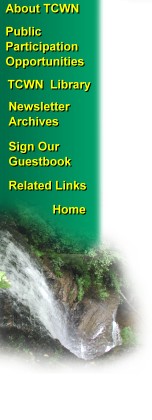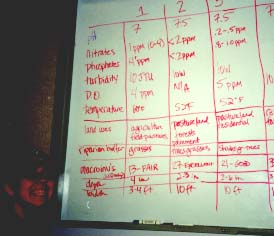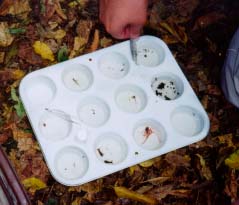


First Annual Duck River Volunteer Water Quality Monitoring Workshop
Columbia State Community College
21 October 2000
An integral part of the TSRA Duck River Project (DRP) involves using volunteer water quality monitors to help identify runoff water pollution (ROWP) in the Duck River watershed. ROWP can come from almost anywhere in a watershed and with the Duck River Watershed being so large (around 3500 square miles) it would be impossible for the project staff to cover much of the territory. Volunteers are incredibly important to the overall effort of finding the problem areas.
Eighteen participants attended the workshop as well as several professional aquatic biologists who helped to lead the groups into the field. The participants included several science teachers, a college student, a few TSRA members and other citizens interested in the project.
We started out the day at the College, where Marshall Spencer (DRP Comm. chair) gave a brief, yet through overview of the project goals and objectives as well as helping participants understand how valuable their commitment is to the overall project. Cynthia Rohrbach (project staff) talked a little about the different characteristics of a stream, how we can measure each and what the data meant in regard to water quality.
Then the real fun began -- we divided into four groups, and went out into the field. It took about 45 minutes longer to get it organized than the agenda called for. But, because each group was lead by a professional aquatic biologist the groups did fine once in the field. Jimmy Smith (TDEC, WPC), Dave Pelren (TSRA and USFWS), Julie Schultz (Earth Force) and Cynthia Rohrbach (DRP project staff) all got rave reviews from the participants, as well they should have, collectively they have about 40 years of aquatic biology experience! Training using professionals helps to ensure that volunteer data will meet quality standards and as a result be useful to the project. Thanks! to all who helped.
|
Tracy Cawell and Bonnie Dixon check water chemistry |

Julie Schultz "I love this data!" |
After the field sampling we ate some pizza and veggies compliments of the Buffalo Duck River Resource Conservation and Development District and TSRA. Once everyone woke from their afternoon siesta we talked about the data participants had collected (see picture) at individual sites and compared the sites to one another. All of the streams that the groups investigated had fair to execellent water quality as assessed on the Izaak Walton Leagues aquatic bug sheet. One difference that participants recognized between sites was in temperature. At one site it was 60 degrees and the other three sites it was 52 degrees. Anyone care to take a guess as to what characteristics of the creeks could influence this? Another site (Maury county) had a very high phosphate level. Interestingly, project staff had sampled this site prior to the workshop and had noticed high levels of conductivity - indicating that something (that conducts electricity) was in the water -- could it be that the volunteers figured out exactly what it is?
Once the data discussions were complete, Larry Lofton of the BDRRCD gave the participants an overview of how to fix different types of ROWP problems. He had a significant amount of literature on Best Management Practices and other activities of the RCD as well as the individual Soil Conservation Districts. These folks are key to solving agricultural related water quality problems and TSRA and project staff are grateful to have them as project partners.
Finally, participants were asked to sign an Adopt-A-River pledge and to fill out an evaluation. Everyone agreed to sign the pledge and adopt a river in the Duck River Watershed (YAHOO!). On this the workshop was a big success. Although, at this point in the day, it was getting hard to keep people there as they wanted to listen/watch the Alabama - UT football game. Overall participants rated the workshop very good to excellent. They liked the opportunities to network, the field activities (although not enough time in the field) and the presenters -- said they seemed knowledgeable about the subjects.
After the day was done and the organizers reflected on all their hard work and how it had paid off -- they realized the real work has just begun...
-John McFadden
|
Ann Spencer looking for bugs |

a very expensive sorting tray |
Resources | Issue Archives